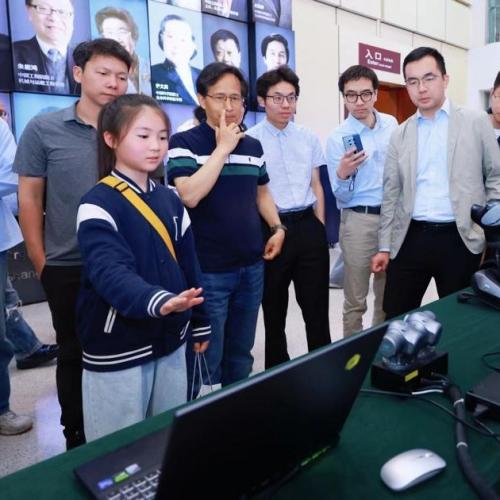



Experts and industry players gathered in Shanghai for a seminar on the bionic vision industry and investment on April 12 to discuss and propel the development and industrial application of bionic eye technology, a field that holds immense promise for revolutionizing robotics and artificial intelligence.
The seminar, which took place at the Shanghai Science Hall, was a brainchild of Professor Zhang Xiaolin, a leading expert in China's bionic vision arena and the director of the Institute of Bionic Vision and Brain-Inspired Intelligence at Shanghai University.
The event attracted luminaries from top research institutions such as the Chinese Academy of Sciences, Peking University and Tsinghua University, alongside industry giants like Xiaomi, iFlytek and BOE.
During the seminar, Professor Zhang underscored the significance of bionic vision technology, which emulates biological visual systems to enhance robotic perception. By mimicking nature, bionic vision technology overcomes critical limitations of traditional machine vision, offering improved depth perception and enhanced adaptability in dynamic environments. This advancement equips robots with superior perceptual abilities, empowering them with robust information acquisition and decision-making capabilities. As a result, robots can swiftly track targets, accurately position themselves in complex environments, and exhibit real-time learning and adaptive behavior.

The practical applications of bionic eye technology have already demonstrated promising results in various sectors, including metro infrastructure monitoring. The technology is poised to expand its footprint in domains such as agriculture, low-altitude airspace management and public safety.
Experts foresee bionic vision playing a pivotal role in the evolution of household robots, enabling them to navigate and interact more effectively in human-centric environments.
Industry projections paint a rosy picture for the future of bionic vision technology. Forecasts indicate that the global humanoid robot market could exceed 400 billion yuan ($54.82 billion) by 2035, while the global machine vision market, as per GGII estimates, is anticipated to approach 140 billion yuan by 2028.
Wu Jinwen contributed to this story.
If you have any problems with this article, please contact us at app@chinadaily.com.cn and we'll immediately get back to you.